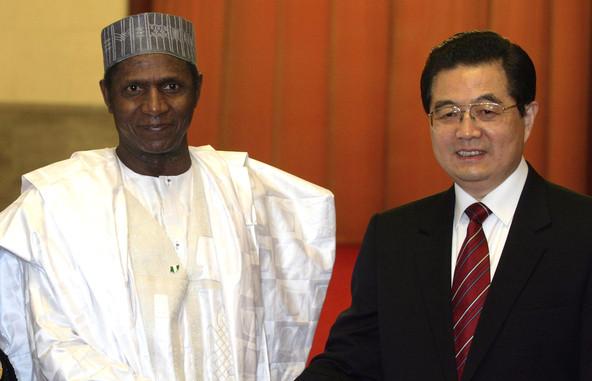CPA’s Unhappy End
In the last month Sudan’s Government has forfeited the title “˜of National Unity.’ Cooperation between the NCP and SPLM hardly exists even in name. This week poses an important test of whether it warrants the name “˜Government’ at all.
Sudan long ago failed many of the basic tests of governance. It doesn’t possess a monopoly on the use of force, doesn’t command the allegiance of large sections of its citizenry. But one test that it usually meets is paying the salaries of civil servants for the most important Muslim holiday, the Eid al Adha. This year the Eid falls at the end of this week, probably on Friday 27th. Muslims are expected to buy and slaughter a sheep. When the Eid falls towards the end of the month, established practice is for employers to pay salaries early so that employees can have cash in hand for the holiday. This year, the government hasn’t yet met this obligation. It seems to have run out of cash itself.
This shortcoming is all the more striking when we note what has happened to public spending since the CPA. Due to the oil boom, all components of expenditure were expanding between 2000 and 2008. After the CPA, international donors pledged huge amounts for post-war reconstruction. Many of those pledges were not met, but the high price of oil more than compensated for any shortfall. Khartoum and Juba could have financed the peace dividend themselves without international assistance.
In fact, the pattern of post-CPA expenditure has been very different. The budget categories that have expanded most rapidly, taking up the great majority of the additional spending, are salaries and security/defence. Both the Federal Government and the Government of South Sudan have treated peace as an obligation to put vast numbers of people on the official payroll. Capital spending has been neglected, with the notable exceptions of the oilfields, the Merowe dam, and infrastructure in and around Khartoum.
Much of this spending pattern reflects the commitments in the CPA, DPA and ESPA. “˜Power sharing’ consists largely of creating vast numbers of new governmental positions. Federalism is another mechanism with similar logic. Almost the whole spending of state governments, and even more so lower levels of administration, is on personnel. Peace agreements are vast employment generation schemes, jobs for the boys.
There must be a better way of designing a peace agreement, than as a patronage based buyout. But, given that this is the agreement that Sudan has got, it should be made to work.
Security and defence spending is less easy to analyze, but it appears that a disproportionately high level of it consists of putting soldiers, policemen and paramilitaries on the payroll. Considerable amounts of this are off-budget, and the recipients of this largesse are not on official record.
A vast expansion of public sector employment is Sudan’s peace dividend. If this were consolidating peace it would be politically justifiable, despite the economic distortions it brings. But, in advance of the 2010 elections and 2011 referendum, and with the NCP facing political-military challenges in Darfur, this spending resembles more than anything a kind of loyalty payments arms race. Both the NCP and SPLM are trying to extend their patronage systems as much as possible, competing with one another and the various other political parties and armed movements. This spending represents an ever-higher proportion of the budget.
In Sudan’s political marketplace, political competition is driving up the demand for loyalty, and consequently the price. The costs of simply running the patronage based political system are consuming the resources available to Khartoum and Juba, and more. At some point the Government will no longer have the money to pay the bill.
When a government fails to pay soldiers and militiamen, or cannot provide enough to satisfy its local powerbrokers, we would expect an increasing pace of rural violence. When a government fails to pay its civil servants, on the eve of the year’s biggest festival, we would expect its legitimacy to be compromised among those who should be its main constituency. (A failing compounded by a sudden increase in the price of sugar, another barometer of meeting basic needs.) And insofar as the public sector payroll is the chief dividend of the CPA for the citizenry, such a failure also marks a milestone in the decay of that agreement.
I hope that for the sake of the many thousands of Sudanese civil servants who depend on a timely salary payment to be able to celebrate the Eid properly, that the Sudan Government finds a way to pay its bills, in the few days left before the holiday. Equally, it must do so for the sake of the CPA.







Without question, the subjective conditions exist for a revolutionary change. The current regime enjoys no support beyond those who garner immediate material benefits from its continued rule and plunder of national resources. The tell-tale signs of internal collapse of confidence are also there, such as the accelerating flight of capital by those with the ability to get their hands on hard currency, a haemorrhage redolent of the last years of Numeyri.
But do the objective conditions exist? The lockdown of Khartoum last week during the incipient soccer war between Algeria and Egypt suggests that they do not. The regime was able to bring the Three Cities to a complete and utter standstill within hours by bringing in its dedicated paramilitaries/police, people whom the Khartoumites had not seen before, and sealing off every major intersection. This is the routine for which the Islamists had practised since 1989, fearing quite correctly that their demise would come from a popular intifada on the streets of the capital.
What happened last week was an ugly show of force that demonstrated once again, if any further proof was needed, that this regime has the capacity to do whatever it takes to stay in power. Sudanese experienced “velvet revolutions” and “people power” long before it became fashionable in the Philippines, Czechoslovakia and Ukraine, but unfortunately our rulers seem to have been quicker to learn the lessons than our citizens. (Professor Michael Kevane proposed an uprising on his blog: http://sudancommentary.blogspot.com/2009/11/let-bluffing-begin.html but I think this is only a nice dream.)
Sorry, but I do not see it relevant to compare the security measures of hooligan control in Khartoum with a revolutionary condition. Last week just saw a rehearsal of security forces’ response to a possible intifada situation. And it seems as if it is effecient. But in case of an general uprising in Khartoum the GOS cannot count fully on the solidarity of the security forces. Some top generals might step in, as they did in the case of Nimeiri’s exit.
The capital flight of hard currency from Sudan seems as a very important indicator of expected major problems in the pipeline. What we are seeing now is maybe the silence before the storm.
But an intifada without some kind of support from the security forces at some level will never accomplish anything in Sudan. A rolling coup d’etat instigated by the man in the street and supported by some level of security involvement could be an option.
Interesting and worrying times for Sudan!
I was in Eritrea during the armed opposition to this regime and witnessed the struggle of different parties; each wanted to mobilize an army of its own. It was as if they were in an arms race against each other. There were unprecedented efforts, and energy went to achieve the regime change; some even believed the regime collapse was imminent. There was also talk about the protected intifada (El Intifada El Mahmiya), which gave the impression that the opposition had possessed all the means to make that possible.
One wonders, if the opposition had all these capabilities, then, to mobilize for war and instigate a protected intifada, even under those repressive and aggressive conditions at the time, why it has failed so far to mobilize the people and prepare them to change the regime through the ballots. Is it much easier to do it through the barrel of gun than a ballot box? Why our politicians, always want to do it the hard way, in the last minute and at the expense of the Sudanese people? It is a phenomenon that warrants a serious investigation.
Dear Hamdan,
You should not overlook the historical fact, indisputable, that political parties in Sudan came to power on the coat-tails of either the military or civil society. They have never succeeded in organising the overthrow of a military regime. They have been magically gifted power by forces they do not control and so they see politics as a lottery: if they wait long enough the roll of the dice will be in their favour.
The sectarian parties have also relied exclusively on their traditional constituencies and the religious standing of their leadership. They never really campaigned on policies at all, and the much vaunted modernization of the Umma and DUP in the late-eighties was entirely superficial, to the extent that many of their leaders not-so-secretly welcomed the Islamist coup.
The only two parties that have ever mobilised systematically and possessed real manifestos are the Sudan Communist Party and the Islamists in their various guises adopted over the years. The downfall of both was their addiction to the short-cut to power through the putsch. In 1971 this destroyed the Communists. Today it is destroying the Islamists and they are taking the country with them on the road to Hell.
Dear Abd al-Wahab,
I completely concur with your explanations. Although I am not sure how many times a lottery addict would have the game on his side. I agree with you though, that the Umma and DUP, together with their different versions are taking their traditional “loyalists” for guaranteed. But this should not be the case now.
In the sixties, after October 1964, the SCP had reached to those remote communities through some of their elements that belong to the working class (many of them in Sudan Railways, or textile factories in Khartoum) and helped establishing what was known as the Regional Unions (El-Ittihadat El-Eigleemiya) such as the Union of the Messirya Sons, the Union of the Nuba Mountains Sons. Again the main mission set for them was to call for cancellation of the native administration (the strategic ally and broker for the sectarians), which was eventually dissolved during Nemeri regime. What would these unions evolve into, had they not been interrupted, by what followed the coup of 1971? The Islamists had the benefit of latecomers and I would argue their success in penetrating these communities by bringing their emerging / educated elites to their side seem to be greater than that of the SCP.
Because of the many changes that have taken place in the socio-economic and political spheres, the whole situation needs be studied again in order to find alternative ways to avoid “the hellâ€.
While reading your posts and comments on this blog I keep asking myself , why persons like you, Ahmed Khalid and others, who clearly have high analytical capabilities as well as unique insights, come together and form study task group on different hot issues facing Sudan today. People like me will be ready to share their experiences and perspectives.
Finally I would like to thank you for your comments; and frankly it has never crossed my mind the idea that we will be dragged to hell accompanying the NIF.